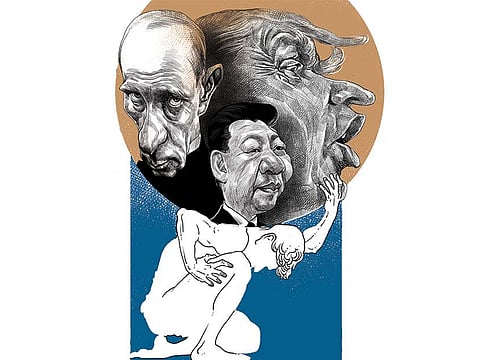Global leadership vacuum
An erratic US president and an over-cautious German chancellor have no vision to reinforce the failing world order

A dangerous vacuum of global leadership is emerging that is far too easy to exploit by those who do not support the existing system of collective management of human affairs. Western powers will lose out as United States’ President-elect Donald Trump gets increasingly unpredictable in his international policies and consequently the US suffers a slow erosion of trust. German Chancellor Angela Merkel may be re-elected and therefore continue as de facto leader of the European Union (EU), but will not offer much global leadership as she continues to muddle through Europe’s permanent state of crisis. This is all good news for Russian President Vladimir Putin and Chinese President Xi Jinping as they pursue their very different national strategies, but share a desire to end what they see as an America-dominated system that they consider Washington has grossly abused to its great benefit.
After 1945, the United Nations, the Bretton Woods system of the World Bank and International Monetary Fund and what became the World Trade Organisation, offered an institutional architecture that allowed the human race to believe that it could manage its affairs in a spirit of mutual cooperation often structured through international laws or treaties. This belief has been manifest most recently in the landmark Paris Agreement of the UN’s Framework Convention on Climate Change (UNFCCC) and its follow-up meeting in Marrakesh last month.
But even the UNFCCC is having a hard time winning over doubters to the multilateral cause and other bodies have lost far more ground. Over the past decade, trust in these institutions has reduced dramatically as western powers have followed more independent and unilateral policies. When former US president George W. Bush’s administration led the charge on attacking Iraq, he did not really care what the UN thought: He just wanted to go ahead, which is what he did supported by Britain, gathering what other support he could find on the way.
Trump changes things in the White House quite dramatically with his policy-making on the run and his impetuous tweeting and other announcements. What makes the situation more volatile is that the team he is assembling around him does not come from established government backgrounds, so they will be unlikely to control him. The example of his dramatic conversations with Taiwan shows Trump moving into his own form of deal-making diplomacy with an unplanned plunge into the first president-level contact since 1979.
To the surprise of many experts on China, Trump seems to have got away with shifting the goal posts and he may do so again, particularly as the rest of the world does not know how to react, but in time, the lack of any structured approach will give his interlocutors (like a future and furious China) all sorts of unnecessary advantages. Trump should be finding a way to use his naivete to cajole or coerce China to follow a particular course, but despite the best efforts of his spin doctors, Trump does not appear to be thinking about this.
One possible explanation for Xi’s relative silence may be that during 2017, he will not be so active on the foreign affairs stage as China goes through its five-yearly leadership reshuffle. There is no prospect of Xi losing his job, but he will be concentrating on strengthening the position of his supporters in the Chinese system. But a different expectation and equally logical would be that at such a time, Xi will use any challenge by Trump to respond forcefully to prove his nationalist credentials. A potential flash-point would be a stand-off around the disputed islands off Korea and Japan or in the South China Sea.
Putin is in a different category. He wants Russia to be accepted as a world power and deeply resents being ignored during the 1990s and early 2000s. Russian expansion in Abkhazia and Ossetia are part of this, as well as the actions in Crimea and Ukraine, and the most recent being his support of Syrian President Bashar Al Assad, which has brought Russia back into the elite group of world powers that is willing and able to extend its military power in order to affect outcomes.
Putin’s focus is currently on Syria and may well return to Ukraine, which should worry Brussels. But the confused leadership of the EU has not even got round to thinking ahead and it is unwilling to show that it is even ready to support fellow-EU members like Estonia that could easily find themselves on the front line. Unfortunately for the EU, Merkel does not show much of a global strategy and not even much of a continental strategy, which gives Putin considerable room for manoeuvre.
The result is a dangerous combination for the liberal democracies of an erratic US president and an over-cautious German chancellor who have no joint vision or leadership with which to reinforce the failing world order. It is a slightly forlorn hope to remind anyone that hope comes from unlikely places, but it is true that Harry Truman was a totally domestic politician who rose to the American presidency and unexpectedly built that world order.
Sign up for the Daily Briefing
Get the latest news and updates straight to your inbox



